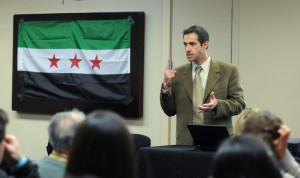Describing ongoing measures of repression that “instill fear in any Syrian’s heart,” but expressing optimism that “the brightest moments for Syria are still ahead,” a panel of speakers addressed “The Syrian Uprising” Monday evening.
The event, which took place in the Tresidder Cypress Room, was hosted by the Muslim Student Awareness Network (MSAN) and the Islamic Society of Stanford University (ISSU). The panel discussion was part of the 2012 Islamic Awareness Series.
The panel featured three speakers: Hisham Ahmed, professor in the department of politics at Saint Mary’s College of California; Jaber Kabash, a physician and board member of the Northern California chapter of the Syrian American Council; and Suzan Boulad, a blogger, non-profit organizer and board member of the Northern California chapter of the Syrian American Council.

Kabash spoke first, providing a background of Syrian history from the French occupation to the post-colonial power struggle and the rise of Assad rule in 1970.
He argued that the Assad dynasty has survived because of the implementation of a personality cult, targeted political and economic policies and the use of a security apparatus.
“The most important method of control is the strong and overlapping security apparatus which is enough to instill fear in any Syrian’s heart,” he said.
Boulad then gave a chronology of the revolution, providing a summary of key events such as the March 15 protests in Daraa that sparked the uprisings.
She emphasized how mainstream media such as CNN or BBC and alternative networks such as Facebook and Twitter tell two different tales of the Syrian situation.
“They want to show the most dramatic parts of the revolution,” she said. “But by not giving growing organic opposition groups the voice in their coverage, it makes it hard for people to understand what Syrians are dying for.”
Boulad also pointed out the difficulty and danger in protesting, saying that, “the Assad regime has grown roots into every element of Syrian society. Most people do not like or love Assad, [but] there is a silent majority who are scared to speak out.”
Boulad acknowledged the efforts of various opposition elements, such as the Syrian National Council, but said that local coordinating committees, which organize protests on the ground, network with other Syrian cities and upload YouTube videos, are “the petri dish of what Syrian democracy will hopefully look like in the future.”
She criticized how some in the media, especially in the West, have framed the revolution as one pitting the Alawi, a Shi’a sect of Islam to which the Assad family belongs, against the Sunnis, the majority Islamic sect in Syria.
“Religion has not defined this revolution as much as some would have us think,” she said.
Boulad said that, while she is optimistic that the “brightest moments for Syria are still ahead,” she warned that, “the longer Assad stays in power, the more Syrians will struggle after the regime falls to rebuild the country in a unified and democratic way.”
Ahmed began by stating, “It is my duty and obligation to talk about the bloodbath in Syria. This is a depressing but heroic unfolding of human trauma.”
He expressed optimism, however, that Assad will be toppled soon, saying, “the question is not whether we crumble but when, how, by whom and under what circumstances. Even Assad’s supporters recognized that his days are numbered.”
Ahmed criticized the Assad government for advocating Arab nationalism while employing divisive strategies to pit factions in Syria against one another.
He concluded by emphasizing that change must come from the Syrian people rather than from Western governments.
“There does need to be a choice between the decadent Assad regime and the revival of Western ambition and exploitation,” he said. “Syrians are not paying with their blood to jump out of a frying pan into the fire.”
Audience members posed questions on topics including the revolution’s impact on U.S. interests in the region, the Syrian-Palestinian link, the effectiveness of Arab peacekeeping forces and the role of the Syrian Diaspora in the revolution.
“I think its really sad what is happening in Syria and how it seems like a stagnant situation,” said audience member Osama El-Gabalawy ‘15, “ but events like these raise awareness and keep us from losing hope.”